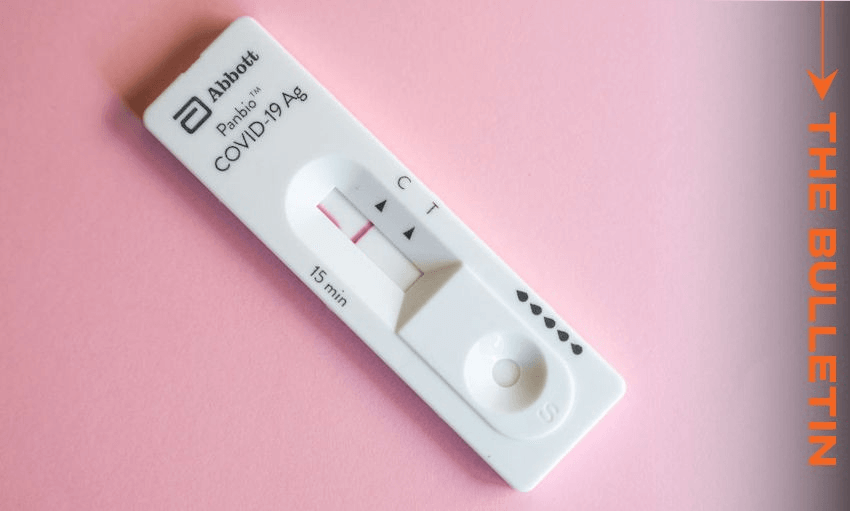It signals a broader shift in how we view the virus, writes Stewart Sowman-Lund in today’s extract from The Bulletin.
To receive The Bulletin in your inbox every weekday morning, sign up here
Tests to cost
From tomorrow, a major milestone in our Covid-19 response will be marked – though it’s perhaps not one everyone will be aware of, or welcome. Rapid antigen tests (or Rats) will no longer be freely available from October 1. As this RNZ explainer details, while Covid-19 testing will still be available, you’ll have to pay for the privilege – a pack of five is advertised online as $16.99 at Chemist Warehouse. It’s been about four years since free Covid testing was rolled out, with people able to pick up rapid tests at pharmacies or specialised collection points for no cost. In June, reported the Herald, health minister Shane Reti confirmed the government was extending the supply of free tests through until the end of September to make sure they were available across winter when illnesses tend to surge.
‘Depressing’
The move has left those in the health sector worried that Covid testing will become less common and only something done by people who can afford it. Microbiologist Siouxsie Wiles called the end of free rat tests “depressing”, in comments shared via the Science Media Centre. “Rapid antigen tests are a really important tool to help people determine whether they have Covid-19 and, if so, take the necessary precautions to prevent spreading the infection to others. They shouldn’t only be available to those who can afford to buy them,” she said.
Otago University’s Michael Baker agreed, expressing concern that removing the funding for Covid tests would limit who tested and could mean further exposure to the virus. As The Press reported, Shane Reti said that free testing was never intended to last forever and the focus now was maintaining access to vaccines and therapeutics. But official health advice still urges people test for Covid if they’re symptomatic, and isolate for five days if the result is positive. It’s also still encouraged that confirmed cases of Covid are lodged online (though official numbers suggest many people are not doing this). It’s not a stretch to foresee fewer people testing, and therefore fewer people isolating, if tests aren’t freely accessible.
Learning to live with Covid
The end of free testing signals a shift in how we view Covid-19. Late last year, the Herald’s Thomas Coughlan reported the government was considering ending free universal vaccinations for Covid-19 as part of its cost-cutting drive (not everyone can access free flu vaccinations and the eligibility rules were adjusted earlier this year, though Covid jabs remain free for everyone aged over five). In a piece for NZ Doctor (paywalled), Fiona Cassie described Covid-19 “business as usual” when discussing the decision to axe funding for free Covid-related GP consultations.
All of this suggests that we are now learning to live with a virus we once attempted to stamp out completely.
It’s something the rest of the world is grappling with as well. Writing for The Conversation last year, Auckland University’s Paula Lorgelly explained that The Netherlands has not had subsidised testing since October 2021, while Australia has made tests free for concession card holders, and states may have additional allowances. In the United States, reported CBS, the government has confirmed free testing will resume later this month after a summer wave of Covid-19 cases. In her piece, Lorgelly noted that as we increasingly learn to live with the virus, as we do with other illnesses like the flu, there is a need to re-evaluate the public provision of tests, vaccines and treatment. “Funding Covid vaccinations, tests and treatments means we are not able to fund other types of health care,” she wrote.
Earlier this year, it was confirmed that millions of dollars worth of expired tests along with PPE and other equipment would be converted into alternative fuels, reported Stuff’s Hannah Martin. Health NZ says any free tests collected before the end of the day will have a shelf life ranging from December 2025 to May 2027.
Does it signal ‘pandemic complacency’?
The end of free testing certainly does not signal the end of Covid-19. Lesley Gray from Otago University said about 50 people a week are still being hospitalised with the virus. In a piece for The Conversation earlier this year, health experts warned of “pandemic complacency” from both political leaders and the public, urging for a continued focus on both prevention and control of Covid. Last year, approximately 1,000 New Zealanders died from the virus and as Michael Baker and others explained in a briefing in December, new waves triggered by evolving variants can happen at any time.
Then there is Long Covid, the effects of which are still being learned. Researchers estimate it’s costing the economy $2 billion a year in lost productivity, reported RNZ. By comparison, this year’s budget allocated just $230 million over four years to Covid and pandemic preparedness. “Long Covid is more than a health crisis – it also imposes an important economic burden,” the researchers said.


